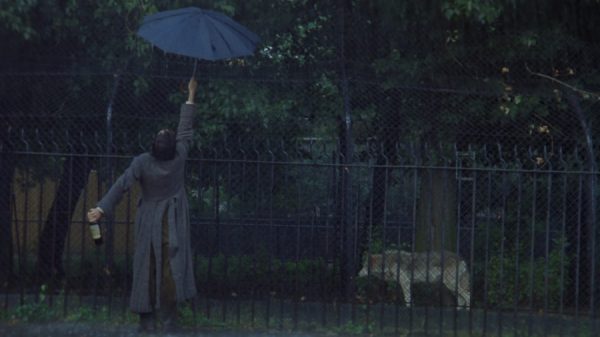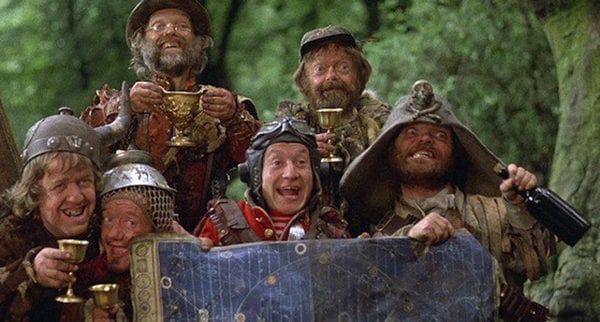Tom Jolliffe takes a look back at George Harrison’s production company, Handmade Films…

Often dubbed the quiet one of the Beatles, George Harrison is well known for the huge cultural impact he had on music in his time with the fab four. As far as musical phenomenons go, there’s a select pantheon for the most absolutely iconic. For America there was Elvis, whose influence spread across the entire world, leaving a long lasting legacy and becoming a galvanising force in popular music. For us Brits, our jewel in the crown was The Beatles. Beatlemania was huge (and spanned the world), and no one else since has quite captured that huge swell of excitement among young fans. Beyond the band, Harrison would have a successful solo career, albeit much like his days in the band, as the most musically underrated behind the creative jousting of Lennon/McCartney.
What may surprise some though, is that Harrison has an impressive track record in cinema. When Monty Python’s The Life of Brian looked all but doomed to collapse prior to filming, having been dumped by EMI, Harrison (along with business partner Dennis O’Brien) stepped in to finance (he mortgaged his house to do so). A new independent British company was born: Handmade films. For the following decade they produced a number of films. The initial output would see a focus on working with a few collaborators and friends but a general sense of funding films that through conventional avenues may have struggled to find the money.

In 1980, a decade that was beginning to see an American fascination with blockbusters and escapism, one of Handmade’s significant offerings, and remaining a milestone film, was The Long Good Friday. Gangster films were becoming almost passée at this point (replaced with punk street cinema like Quadrophenia). Likewise the gritty British crime film was becoming consigned to the likes of low budget cinema such as Scum. The Long Good Friday, glossy, somewhat lavish (at least for an Indie Brit film) emerged nearly a decade after Get Carter. The film would make Bob Hoskin’s a star, much sought after in the 80’s, and inevitably making a breakthrough in the US by the end of the decade. It’s an essential piece of British cinema, that’s stylish, iconic, anchored by great acting and a brilliant score. The films legacy is long lasting, not least for its direct influence on countless British gangster films in the next few decades, most notably Guy Ritchie, who would later re-galvanise the genre again with Lock, Stock and Two Smoking Barrels. Lock, Stock ironically, was actually from the second iteration of Handmade (after the original company folded in 1991).

Handmade also launched the directorial career of Terry Gilliam. He’d helmed a Python feature and the unsuccessful Jabberwocky prior, but Time Bandits would be the one (I guess being very successful helped) which got his momentum going. Ironically, after Time Bandits Gilliam didn’t have a film as successful for over decade, but he’s always fought against the box office tides with his work. Harrison also contributed on the soundtrack for Time Bandits. Bob Hoskins lead another Handmade film a few years after, the hit film Mona Lisa (directed by Neil Jordan). It earned Hoskins an Oscar nomination in the process (and a Bafta Win).
In 1987, one Handmade film, with probably the biggest cult following of any, saw Bruce Robinson make a partly autobiographical film about life at the end of the 60’s in Camden as an out of work actor. Robinson, thought an acclaimed writer for The Killing Fields, found Withnail and I proving a difficult sell until Handmade. An oddball comedy drama where nothing much particularly happens in the holidaying excursions of two hopeless and unemployed actors (one with some hope and potential and the other a lost cause). With a great soundtrack (including a Harrison track of course) and it’s unique style, it’s fair to say that Withnail’s legacy was a slow burner. Whilst the film was certainly acclaimed, there wasn’t a big audience during it’s original release. Though it was a very small budget, just about breaking even, it was deemed a financial disappointment at first (before doing very well on video). Of course in time, by the mid-90’s it was becoming increasingly popular among cult fan circles. A decade after its release and it had a level of fandom which extended to quotathons, location hunts, drinking games and style imitation. Among students in particular, the film was legendary by the end of the 90’s and still is.

Ultimately, and somewhat ironically, though the cultural legacy of Handmade films has a significant debt to Withnail, it’s ultimate fate was partly set in motion by somewhat disappointing box officer numbers. A couple of years later, Robinson’s follow up film (with Richard E. Grant again), How To Get Ahead in Advertising was a failure. If Withnail was unconventional and odd, Robinson’s follow up was even more surreal and off kilter. It’s an enjoyable film with Grant in brilliant form, and one I often remember seeing trailers for at the beginning of several VHS tapes of the era, and being utterly enamoured by the notion of a man growing a second head.
In 1991 the company was hampered by box office failures and O’Brien’s debts, leading to disbanding. A few years later they were bought out by Paragon, a Canadian company (they released Lock, Stock). Between O’Brien and Harrison things turned very sour with the latter suing his former business partner (for fraud and negligence) and eventually winning just over £11 million in the mid-90’s. Still, for a decade, with a kind of seat of the pants verve, Handmade produced a number of unique, special and timeless British films. A memorable company logo that begins the cult classics like Time Bandits, The Long Good Friday and Withnail and I.
Tom Jolliffe is an award winning screenwriter and passionate cinephile. He has a number of films out on DVD/VOD around the world and several releases due in 2020/21, including The Witches Of Amityville Academy (starring Emmy winner, Kira Reed Lorsch), Tooth Fairy: The Root of Evil and the star studded action film, Renegades. Find more info at the best personal site you’ll ever see here.











